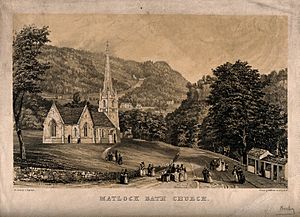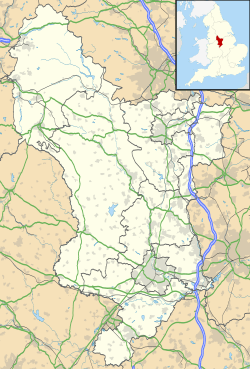Holy Trinity Church, Matlock Bath facts for kids
Quick facts for kids Holy Trinity Church, Matlock Bath |
|
|---|---|

Holy Trinity Church, Matlock Bath
|
|
| 53°07′3.22″N 1°33′41.18″W / 53.1175611°N 1.5614389°W | |
| Location | Matlock Bath, Derbyshire |
| Country | England |
| Denomination | Church of England |
| Website | holytrinitymatlockbath.org.uk |
| History | |
| Dedication | Holy Trinity |
| Consecrated | 4 October 1842 |
| Architecture | |
| Heritage designation | Grade II listed |
| Designated | 26 October 1972 |
| Architect(s) | John Grey Weightman and Matthew Ellison Hadfield |
| Groundbreaking | 8 June 1841 |
| Administration | |
| Parish | Matlock Bath |
| Deanery | Wirksworth |
| Archdeaconry | Chesterfield |
| Diocese | Derby |
| Province | Canterbury |
Holy Trinity Church in Matlock Bath, Derbyshire, is a special building. It's a Church of England parish church and is listed as a Grade II listed building. This means it's an important historical building that needs to be protected.
Contents
History of the Church Building
Starting the Church
The first stone of Holy Trinity Church was placed on June 9, 1841. This was a big event! A special message was put inside a glass container and placed in the church's foundations. This message said the church was being built to honor God and help people. It was paid for by donations from many people.
Who Built It?
The church was designed by two architects from Sheffield, John Grey Weightman and Matthew Ellison Hadfield. It was officially opened on October 4, 1842. A bishop named Thomas Musgrave led the special ceremony.
Changes Over Time
The church was made bigger in 1873–74. An architect named T.E. Streatfeild added a new section on the south side. He also made the main part of the church longer and added rooms for the church's leaders and the organ. A special decorated screen, called a reredos, was put in place in 1874.
In the 1970s, the inside of the church was changed again. Some parts were separated, and a special area for baptisms was added to the floor. The main floor of the church was also raised.
Leaders of Holy Trinity Church
Vicars Who Served
Many vicars have led the Holy Trinity Church community over the years. A vicar is like the main priest or minister for the church. Here are some of the people who have served:
- William Gibbs Barker (1842–1853)
- Edward Synge (1853–1859)
- John Martin Maynard (1859–1865)
- Charles Evans (1865–1869)
- Raymond P. Pelly (1869–1874)
- Edward Latham (1875–1883)
- Charles Baker (1883–1914)
- William Askwith (1914–1921)
- Edward J.M. Davies (1921–1929)
- Clement T. Walker (1929–1934)
- Alfred Phibbs (1934–1944)
- William G. Lee (1944–1950)
- Norman B. Johnston (1950–1955)
- L.E. Waghorn (1955–1958)
- H.E. Brown (1958–1966)
- James Song (1966–1977)
- H. Collard (1977–1992)
- J. Wheatley Price (1992–1997)
- John Currin (1997–2007)
- Nick Grayshon (2007–current)
Beautiful Stained Glass
The church has some lovely stained glass windows.
- One window in the main part of the church, made in 1889 by Ward and Hughes, shows the story of the Good Samaritan.
- Another window, in the north side of the church, was made in 1923 and shows the Nativity scene.
Church Community
Holy Trinity Church is part of a larger group of churches. It works together with St Mary's Church, Cromford. This is called a United Benefice.
The Church Organ
History of the Organ
The church once had a large pipe organ. It was built in 1876 by William Hill and cost about £350. This was a lot of money back then! The organ was first played on April 18, 1876, by Arthur Smith. You can find more details about this old organ on the National Pipe Organ Register.
However, in 1975, the pipe organ was replaced with an electronic organ. The pipes from the old organ were removed and sold in 1993.
Organists of the Church
An organist is the person who plays the organ during church services.
- John Goddard Barker was the organist from 1884 to 1889. He later became the organist at All Saints' Church, Matlock Bank.
- Phyllis Wright played the organ from 1944 to 1966.
More to Explore
- Listed buildings in Matlock Bath
 | Isaac Myers |
 | D. Hamilton Jackson |
 | A. Philip Randolph |


